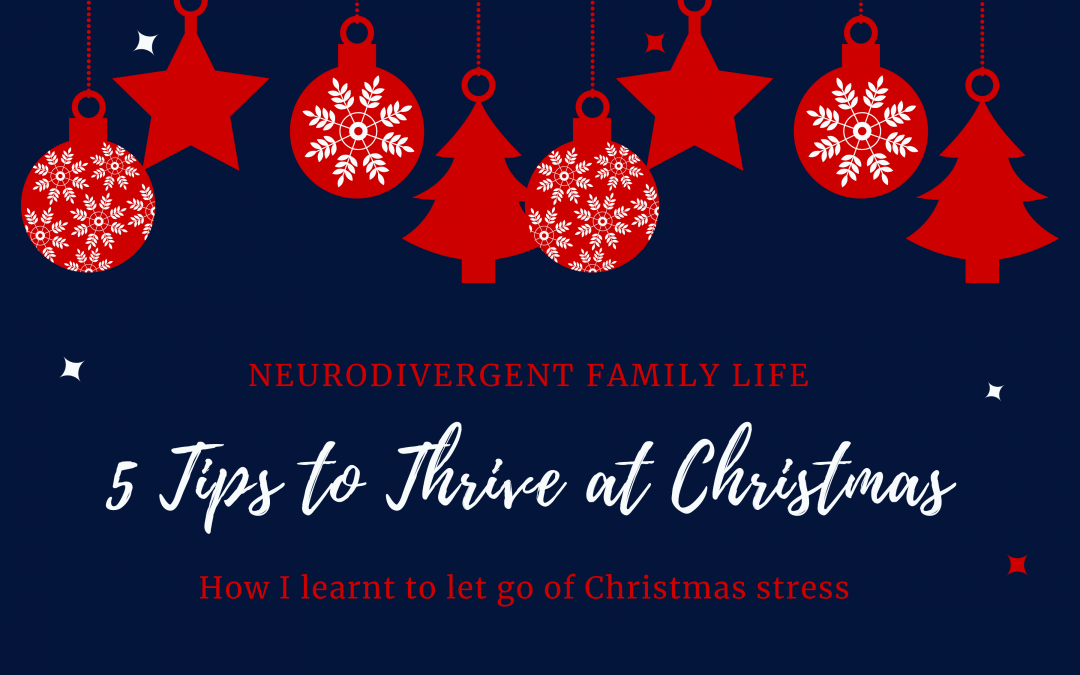Christmas can be a hellish ride of tears, stress and excess. Especially if you are in charge of buying, feasting, and planning for your family. My family is no different – we are a neurodiverse family, both my son and I are neurodivergent, and dad is neurotypical. This means that my son and I experience the world differently, and while I have had a lot of practice in making my needs known and doing things my way, my son is still learning.
We have a lot of ups and downs, misunderstandings, overwhelm, and overload, so adding the Christmas hype on top has led to week long recoveries. We had a few disasters along the way before I actively let go of meeting other peoples expectations and started to enjoy myself.
So I present to you 5 tips on thriving at Christmas.
1. Remember it is one day.
Love for family is everyday. My childhood memories of Christmas are always of love, happiness, and laughing, but for whatever reason that frivolity seemed to be unique to Christmas. As a parent now, I think there is less of a façade between parents and kids, we are silly, more relaxed, lots more emotions, a lot more talking.
It may be because Gilbert and I need to understand more, have a stronger sense of emotions and different needs, the off shoot is that fun and frivolity isn’t tied just to Christmas, it is on the daily. Christmas is fun (mostly), different routine for the day, but no more than most other days, just different fun.
The ride up to Christmas is a long one, and it is getting started early every year. This year I saw Halloween and Christmas decorations out at the same time. But I am happy to ignore all the christmas stuff until December. Just because it is there, doesn’t mean you need it nor buy it.
The more decorations you have isn’t a direct correlation to how much you enjoy yourself – but it is a direct correlation to how much you have to pack up and store.
One year my son was so wrapped in the free cardboard Woolies cutouts we just did a whole Christmas scene instead of a tree. Perfect easy to pack up, or recycle. Last year I put up a home made advent calendar instead of a tree. Everyone was happy. I got to flex my creativity, Gilbert got a small chocolate, Dad didn’t have to clean anything up. Prime storage real estate isn’t taken up throughout the year.
To me, a real tree is just a nightmare of planning and cleaning, from the transporting to the putting up and removal, I feel the tension just thinking about it. One year in Canada we had a Christmas Tree up so long that it was an Easter Tree, the idea of doing anything about the Christmas tree was too overwhelming. I did love the Easter Tree though – that was pretty awesome.
2. Set expectations and boundaries
Talk about the Christmas present situation as much as possible, if your kiddlets are not getting something from their list to Santa, make sure they know it. You can build expectation around the things they are getting. One of the hardest things to process is when something doesn’t happen. There is multi layered waves of emotions, from dreaming, and thinking that it is going to happen, to the crushing blows when the last present is opened and the dreams do not come true. It is harder and harder to hold a smile and wave when your soul has been crushed from the inside. So it is easier to make sure if the big dream present isn’t going to happen, stop the building of expectation before the sadness overrides the joy for the rest of the day.
Quick tip on the side – let Santa bring the small stuff, and mum and dad give the rest. That way you can put the presents out early and enjoy the talking and guessing.
Know where your tender spots are. Family gatherings can be a source of massive tension. Your family seem to know all the right buttons to push to highlight your insecurities. Your family doesn’t change just because it is Christmas, if someone is a nit picky arse hat every other day of the year, they will still be that nit picky arse hat on Christmas. Let that be ok, but know that only you know your whole story, the background the ins and outs of all the different situations, and if you are happy with your choices and decisions, it is no one else business. Take out their energy to influence you, and watch the as the tension never build. If you need to step away from the family allow yourself to do it before the build up.
3. See others strengths, appreciate – and then delegate to them.
Whether you are hosting or joining a family lunch – if you know what people are good at doing , let them. One person in charge or getting drinks, setting the table, giving the presents out, entertaining the kids, ask if the host needs help and if not stay out of the kitchen, now is not the time for a conversation. Ask people to bring a dish – be specific, you know your aunt makes the best layered salad – job allocated. You know someone is driving past a chicken shop – allocate the gravy – large x 2 (always need more gravy), know someone isn’t going to get out of the kitchen – give them a job.
Also, take your time. Be realistic about the amount of time needed to open presents, and remember you don’t need to open all the presents all at once. You can spread it over the day. But plan what you need to do in the morning, how long it is going to take to get ready to travel, travel time, and prepare to be late. Don’t be the gate keeper of information. Talk about it lots with family and partner, what the day is going to be, where you need to be and when, ask someone to figure out the leaving time – have them invested in make the day as smooth as possible. Show gratitude for your presents before you open them – most people are a bit crap at buying presents, but being excited just to get one makes people happy they put in the effort
4. Be ready for the let down
Bigs days require big recovery. The mess will be there for as long as you ignore it. So spend as long as you can in your pjs. Numbing from feelings and disassociation in the recovery days is a from of resetting. There may be some tears and that is ok.
5. Enjoy yourself!
Know what you need to enjoy yourself. Feel free to bring it, do it, have it.
Connect with Joanne
Facebook: Better Being Me
Instagram: @betterbeingme_bbme
Podcast: Better Being Me

ARTICLE BY
Joanne Hatchard, Better Being Me
As a Neurodivergent Family Therapist Joanne Hatchard of Better Being Me is an absolute CHAMPION for the neurodivergent community, and her business (BBMe) shines a light on what it is to find comfort in who you are as a human – and how to best function and work and play – AS YOU.

